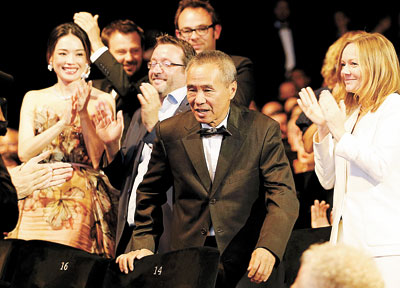|
TAIWAN’S Hou Hsiao-hsien scooped the best director award at the Cannes Film Festival on Sunday for his slow-burning minimalist drama “The Assassin.”
The film is set in ninth-century China, at the end of the Tang Dynasty, with Asian megastar Shu Qi playing a highly trained female assassin who, after failing in one mission, is sent back to her home province to kill its governor, who is also the man she loves.
Despite its action-packed premise, the film is a study in lingering, contemplative art from director Hou, who continues a similar aesthetic from his previous films “Millennium Mambo” and “The Puppetmaster.”
Speaking through an interpreter, Hou kept his acceptance speech short and sweet, saying, “It’s difficult to make cinema, to find financing. I want to thank all my crew and cast.”
The 68-year-old is one of the most recognizable names in Taiwan’s “New Wave” cinema, having won a string of international film prizes, including the Golden Lion at the Venice Film Festival for “City of Sadness” in 1989 and the 1993 Cannes Film Festival third place prize for “The Puppetmaster.”
Born in China’s Guangdong Province in 1947, Hou moved to Taiwan with his family the following year to escape the civil war. He started working in the film industry in 1973 after graduating from college with a film degree and shot his first feature film, romantic comedy “Lovable You” (1981).

Hou is best known for lingering camera shots and minimalist dramas depicting the upheavals in Taiwan in the 20th century. His autobiographical movie “A Time to Live, a Time to Die” (1985) told the story of a family that fled to Taiwan from the mainland in the 1950s.
“The City of Sadness,” which won him international recognition, touched on a taboo — the Feb. 28, 1947 massacre by Kuomintang troops that took over Taiwan from the Japanese colonial power after WWII, and a family caught up in the political turmoil.
“Three Times” portrayed three love stories set in three different periods and competed for the Cannes Film Festival’s Palme d’Or in 2005.(SD-Agencies)
Palme d’Or: “Dheepan” by French director Jacques Audiard
A thriller spotlighting the plight of Sri Lankan refugees, including a traumatized former insurgent, as they try to build new lives in France.
Grand Prize: “Son of Saul” by Hungarian director Laszlo Nemes
The 38-year-old Nemes’s first feature, this movie was widely acclaimed for taking audiences into a Nazi concentration camp and showing the Holocaust in a different way.
Jury Prize: “The Lobster” by Greek director Yorgos Lanthimos
Starring a paunchy, deadpan Colin Farrell, “The Lobster” is a weird but well-received movie about single people who are transformed into animals if they don’t find a mate.
Best actor: Vincent Lindon for “The Measure of a Man”
Talented, gruff French character actor Lindon scooped the prize for his performance as a laid-off factory worker desperately searching for a job.
Best actress: Rooney Mara for “Carol,” Emmanuelle Bercot for “Mon Roi”
Mara won the award for her part in lesbian love affair “Carol,” in which she co-starred with Cate Blanchett, while France’s Bercot was also awarded for her performance as a woman looking back on a destructive relationship with a deceitful but charming boyfriend.
Best director: Hou Hsiao-hsien for “The Assassin”
A leading figure in Taiwan’s “New Wave” cinema, Hou won for his slow-burning minimalist drama set in ninth-century China featuring Asian megastar Shu Qi as a female assassin who, after failing in one mission, is sent back to her home province to kill its governor, who is also the man she loves.
Best screenplay: “Chronic” by Michel Franco
Mexican writer-director Franco won for his bleak film about an end-of-life nurse played by Tim Roth who grows too close to some of his patients and faces difficult moral choices about assisted suicide.
|

